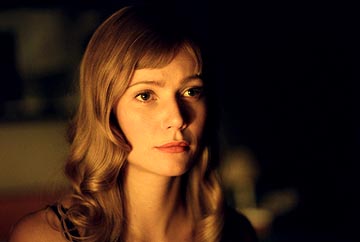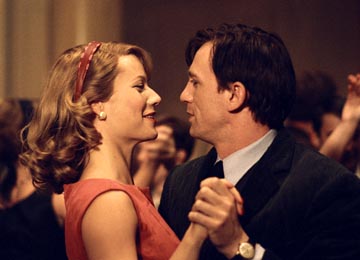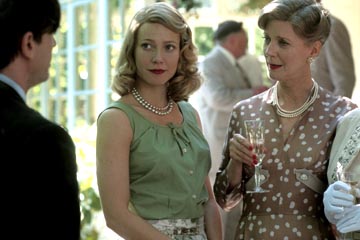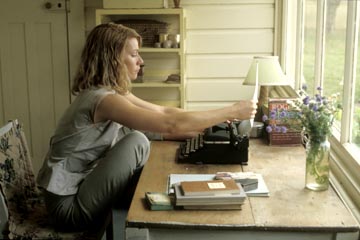|
GARY CHEW/Sacramento In just two days, October 27th, 2003, Sylvia Plath would be observing her 71st birthday had she not killed herself on a cold London night in February of 1963. “Sylvia,” a new movie just now opening, is about part of the life of this American poet and novelist who lived even less time than Mozart. This restrained, yet moving film gives a rather non-judgmental glimpse at the over-the-top love affair, marriage and subsequent breakup of Sylvia Plath and Edward “Ted” Hughes who, in 1984, was named British poet laureate. Most of what is in the well-crafted script by John Brownlow comes from a book of poetry called “Birthday Letters,” written by Hughes and published in 1998. ( So, for Plathophiles, there is no extended borrowing from “The Bell Jar” or “Lady Lazarus” or “Ariel.”) In fact, Brownlow has been quoted as saying that his intent in writing the screenplay for “Sylvia” was to tell a story that was not to be dependent on the moviegoer being interested in Sylvia Plath. I’d say that Brownlow has succeeded. A fine cast is on hand for “Sylvia.” Gwyneth Paltrow comes back to serious acting in the title role. Paltrow is nearly perfect for the part right now, since she greatly resembles Plath and, at thirty, is Plath’s precise age when the suicide occured.
Listen closely to Daniel Craig speak on the soundtrack. Like the face, there’s a bit of Burton in his voice as well. Another satisfying turn in the casting is Blythe Danner in a supporting role as Sylvia’s mother. Of course, Danner is the real-life mom of, yes, you guessed it (if you didn’t know), Gwyneth Paltrow.
Well, it’s primarily about a very bright, creative woman with a history of mental illness who is ultimately overwhelmed by depression. So overwhelmed that, finally, she leaves a snack on the bedside table for her two sleeping children, then, sealing off the door to their room with tape, sticks her head in the unlit oven of the kitchen stove and kills herself. (The children survive to this day. Hughes died of cancer soon after the publication of “Birthday Letters.”)
But that's not what people usually go to movies for, even if the screenwriter of a more attractive film has found the ability to write its script simply because he or she can be-with and stay-with that sense of internal angst which, too often, quietly lurks at the foundation of the process for what's being fashioned. It's what makes things get created whether the symphony, or poem, or novel...or even the movie...makes us laugh or makes us cry. And, I find that fascinating. But as entertainment, maybe there should be the tacking-on of a happy ending. So, I warn you. “Sylvia,” just like “The Hours,” is a fine piece of writing, acting and cinema. Enjoy?
Gary Chew can be reached via email at garychew@comcast.net.
|



